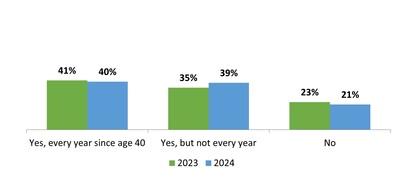(MENAFN- PR Newswire)
Only five percent of women surveyed could identify all the breast cancer risk factors.
COLUMBIA, Md., Oct. 1, 2024 /PRNewswire/ -- A new MedStar health national survey finds that 60-percent of women aged 40 and over are not following the recommendation from the American College of Radiology to have a yearly mammogram if they're at average risk. Twenty-one percent of those surveyed in the same age group say they have never had a mammogram. Why? The reason most cited was they've had normal mammograms in the past. Some women worry mammograms are painful and others say cost and lack of insurance coverage are keeping them from getting a routine mammogram.
Continue Reading
"Mammography is one of the best tools we have for early detection and saving lives." Lucy De La Cruz, MD
Post this

Women over 40 were asked if they follow the American College of Radiology recommendation for a yearly mammogram for those at average risk.
Those statistics come despite 75% of the women surveyed saying they are "somewhat" to "very concerned" about their breast health.
"We know that mammography is one of the best tools we have for saving the lives of women because mammograms allow for early detection and access to better treatments," said Lucy De La Cruz, MD , chief of the Breast Surgery Program at MedStar Georgetown University Hospital. "Deaths from breast cancer are decreasing because we are catching some breast cancers early enough that women can be successfully treated and even cured.
I am disheartened that so many women still report skipping this life saving screening."
MedStar Health breast cancer experts encourage women, starting as early as age 30, to talk to their doctor about their own personal breast cancer risk and begin developing a plan to start mammograms as soon as possible. This becomes even more important as women get older.
Normal mammogram in the past is no reason to skip
"Just because a woman has had a normal mammogram in the past doesn't mean she's free and clear of the disease her entire life or is at lower risk of developing breast cancer," said Michelle Townsend Day, MD , chief of breast imaging and chair of radiology for MedStar Union Memorial and MedStar Good Samaritan Hospital.
"It's important to have regular screenings so we can compare images from year to year and look for changes that could indicate breast cancer. I also understand women are concerned that a mammogram is painful, but a mammogram only takes about 10 minutes and is much less painful than the course of breast cancer treatment."
Dense breast tissue, higher risk
The Food and Drug Administration last month implemented a new rule that requires all mammography facilities to notify patients if their mammography indicates they have dense breast tissue, which is also a factor that puts women at higher risk of breast cancer. In the survey, 36% of respondents identified dense breasts as a risk factor for breast cancer.
"Dense breast tissue can make cancer more difficult to detect on a mammogram because a suspicious lump can look the same white color as dense breast tissue," said Dr. Day. "Dense breasts are also a risk factor for developing breast cancer. Patients should talk about this issue with their providers who might recommend breast
MRI in addition to mammography."
More survey insights include:
Only 5% of respondents could identify all the
risk factors for breast cancer which include:
Family history
Cigarette smoking
Age
Dense breasts
Use of certain oral contraceptives
Menopause over age 55
First child after age 30
Only 26% could identify all the
symptoms of breast cancer which include:
New lump in breast or armpit
Pain in any area of the breast
Any change in size or shape of the breast
Thickening or swelling of the breast
Nipple discharge including blood
Irritation or dimpling of the breast skin
Pulling in of the nipple or pain in the nipple area
Redness or flaky skin in the nipple are or breast
Thirty percent of women surveyed 18+ do not visit a gynecologist.
Another reason women report for skipping their mammograms – 18% say they don't have family history of breast cancer. Dr. Day says most breast cancers are diagnosed in people with no family history so that should not factor into a decision to delay a mammogram.
SOURCE MedStar Health
WANT YOUR COMPANY'S NEWS FEATURED ON PRNEWSWIRE?
440k+
Newsrooms &
Influencers
9k+
Digital Media
Outlets
270k+
Journalists
Opted In
GET STARTED
MENAFN01102024003732001241ID1108735478
Legal Disclaimer:
MENAFN provides the information “as is” without warranty of any kind. We do not accept any responsibility or liability for the accuracy, content, images, videos, licenses, completeness, legality, or reliability of the information contained in this article. If you have any complaints or copyright issues related to this article, kindly contact the provider above.